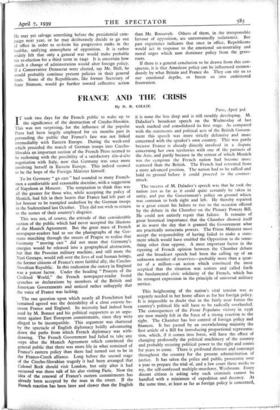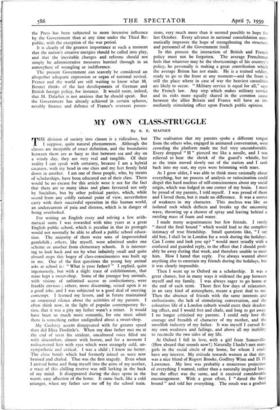FRANCE AND THE CRISIS
By D. R. GILLIE
T took two days for the French public to wake up to I the significance of the destruction of Czecho-Slovakia. This was not surprising, for the influence of the popular Press had been largely employed for six months past in persuading the public that France's fate was not linked irremediably with Eastern Europe. During the week-end which preceded the march of German troops into Czecho- Slovakia an important section of the French Press seemed to be reckoning with the possibility of a satisfactory tete-a-tete negotiation with Italy, now that Germany was once more involving herself in Eastern Europe. This indeed seemed to be the hope of the Foreign Minister himself.
To let Germany " go east " had sounded to many French- men a comfortable and reasonable doctrine, with a suggestion of Napoleon at Moscow. The temptation to think thus was all the greater for those who, while accepting the policy of Munich, had felt in their hearts that France had left part of her honour to be trampled underfoot by the German troops in the Sudetenland last October. They did not wish to return to the scenes of their country's disgrace.
This was not, of course, the attitude of that considerable section of the public which had never accepted the illusions of the Munich Agreement. But the great mass of French newspaper-readers had to see the photographs of the Ger- mans marching through the streets of Prague to realise that Germany " moving east " did not mean that Germany's energies would be released into a geographical abstraction, but that the Prussian military machine, and still more the Nazi Gestapo, would roll over the lives of real human beings, the former citizens of France's most faithful ally, the Czecho- Slovakian Republic. In this realisation the outcry in England was a potent factor. Under the heading " Protests of the Civilised World," the French newspaper-reader found speeches or declarations by members of the British and American Governments and noticed rather unhappily that the voice of France was lacking.
The one question upon which nearly all Frenchmen had remained agreed was the desirability of a close entente be- tween France and England. Its necessity had indeed been used by M. Bonnet and his political supporters as an argu- ment against East European commitments, since they were alleged to be incompatible. This argument was shattered by the spectacle of English diplomacy boldly adventuring down the paths from which French diplomacy was with- drawing. The French Government had failed to take any steps after the Munich Agreement which convinced the general public that there was more life in what remained of France's eastern policy than there had turned out to be in the Franco-Czech alliance. Long before the second stage of the Czecho-Slovakian tragedy it had been arranged that Colonel Beck should visit London, but only after it had occurred was there talk of his also visiting Paris. Now the idea of the renewal of France's eastern commitments has already been accepted by the man in the street. If the French reaction has been later and slower than the English Paris, April 3rd. it is none the less deep and is still steadily developing. M. Daladier's broadcast speech on the Wednesday of last week marked and consolidated its first stage. As compared with the statements and political acts of the British Govern- ment this speech was more strictly defensive and more concerned with the speaker's own country. This was partly because France is already directly involved in a dispute concerning her own territories with one of the partners of the Axis, and partly because in the retreat of which Munich was the symptom the French nation had become more scattered than the British. The French had retreated from a more advanced position. The nation had to be rallied and hold its ground before it could proceed to the counter- attack.
The success of M. Daladier's speech was that he took the nation just as far as it could quite certainly be taken in unity, and put the Government's policy on ground which was common to both right and left. He thereby repaired to a great extent his failure to rise to the occasion offered by the debate in the Chamber on the Plenary Powers Bill. He could not entirely repair that failure. It remains of great historical importance that the Chamber showed itself at its worst the day that it granted the Government what are practically autocratic powers. The Prime Minister must accept the responsibility of having failed to make a state- ment which would have enabled the Opposition to do some- thing other than oppose. A most important factor in the ripening of French opinion between the Chamber debate and the broadcast speech had been the calling up of an unknown number of reservists—probably more than a quar- ter of a million—an action which convinced the most sceptical that the situation was serious and called forth the fundamental civic solidarity of the French, which has its strongest expression in the principle of universal military service.
This heightening of the nation's vital tension was as urgently needed in her home affairs as for her foreign policy. It is impossible to doubt that in the fairly near future the country's political life will have to be radically overhauled. The consequences of the Front Populaire victory in 1936 are now mainly felt in the force of a strong reaction to the right. The Chamber has lost control of foreign policy and finances. It has passed by an overwhelming majority the first article of a Bill for introducing proportional representa- tion, which, if it comes into force, will have the effect of changing profoundly the political machinery of the country and probably securing political power to the right and centre for years to come. There is profound distrust and contempt throughout the country for the present administration of justice. It has taken the police and public prosecutor over a year to prepare the trial of, and a law court three weeks to try, the self-confessed multiple-murderer, Weidmann. Every decent citizen is asking why such criminals cannot be handled with a minimum of expedition and decency. At the same time, at least as far as foreign policy is concerned, the Press has been subjected to more intensive influence by the Government than at any time under the Third Re- public, with the exception of the war period. It is clearly of the greatest importance at such a moment that the nation's creative energies should be called into play, and that the inevitable changes and reforms should not simply be administrative measures hurried through in an atmosphere of wrangling or indifference.
The present Government can scarcely be considered an altogether adequate expression or organ of national revival. France and the world are still waiting to know what M. Bonnet thinks of the last developments of German and British foreign policy, for instance. It would seem, indeed, that M. Daladier is not anxious that he should speak. But the Government has already achieved in certain spheres, notably finance and defence of France's overseas posses- sions, very much more than it seemed possible to hope for last October. Every advance in national consolidation auto- matically improves the hope of strengthening the structure and personnel of the Government itself.
In this process the interaction of British and French policy must not be forgotten. The average Frenchman feels that whatever may be the shortcomings of his country's policy, he personally is making a great contribution which the average Briton has not made. He is a trained soldier, ready to go to the front at any moment—and the front is still the place where in case of war the heaviest casualities are likely to occur. " Military service is equal for all," says the French law. Any step which makes military service and its risks more equally shared in the common cause between the allies Britain and France will have an im- mediately stimulating effect upon French public opinion.











































 Previous page
Previous page